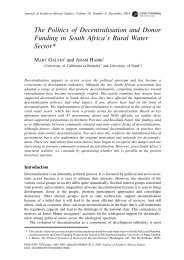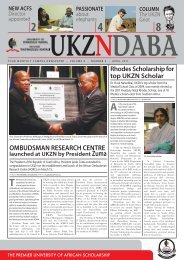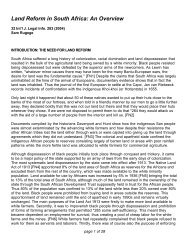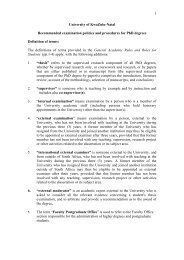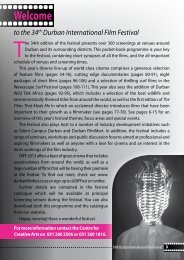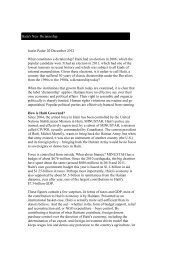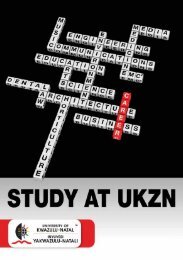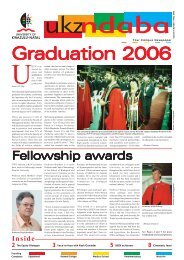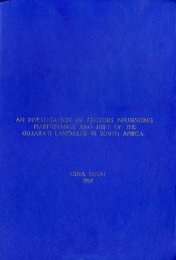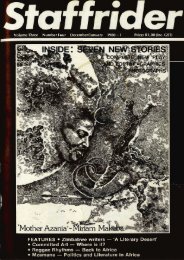Staffrider Vol.6 No.2 1985 - DISA
Staffrider Vol.6 No.2 1985 - DISA
Staffrider Vol.6 No.2 1985 - DISA
You also want an ePaper? Increase the reach of your titles
YUMPU automatically turns print PDFs into web optimized ePapers that Google loves.
At last year's Zimbabwe Book Fair Njabulo Ndebeie received the Noma Award for hisbook Fools, published by Ravan Press. Here is the full text of his acceptance speech.NOMA AWARD^ rnotograpns oy isiaay rartriage m* jm/kcektaace Sjkeeckby Njabulo S. NdebeieSometime after the notorious Land Act of 1913 was passedin the white South African Parliament, a Lands Commissionwas established to look into the effects of the legislation.This Act, it will be remembered, was the one responsible forthe granting of only 13 percent of land in South Africa toAfricans, while the rest was to be the domain of the whiteman. One of the most critical observers of this phenomenonas it was unfolding was Sol Plaatje, one of the major figuresin African writing in South Africa. His book, Native Life inSouth Africa (1916) is a landmark in the historiogrpahy onSouth African political repression. The book is remarkablenot only for its impressive detailing of facts but also for itswell considered rhetorical effects which express intelligentanalysis, political clarity, and a strong moral purpose.In his analysis of the Report of the Lands Commission,Sol Plaatje notes, among other observations, thatmwhile the ruling whites, on the one hand, contentthemselves with giving contradictory definitions oftheir cruelty the native sufferers, on the other, give nodefinitions of legislative phrases nor explanations ofdefinitions. All they give expression to is their bittersuffering under the operation of what in their experiencehas proved to be the most ruthless law that everdisgraced the white man's rule in British South Africa.(355-6)Plaatje's observation here is of very special interest to me. Hedocuments here one of the most debilitating effects ofoppression: the depriving of the oppressed of any meanigful,significant intellectual life. Because they no longer have aneffective hand in controlling history, they seem doomed torespond and seldom to initiate. Those doomed to respondseldom have the time to determine their real interests. Thatthe capability to initiate action has been taken out of theirhands implies also, that their ability to define has beendrastically reduced. Plaatje notes here, how the Africanoppressed appear to have been reduced to the status of beingmere bearers of witness. They do a good job of describingsuffering; but they cannot define its quality. The ability todefine is an intellectual capability more challenging, it seemsto me, than the capability to describe. For to define is tounderstand, while to describe is merely to observe. Beyondmere observation, the path towards definition will begin onlywith an intellectual interest in what to observe and how toobserve.It seems to me that a large part of the African resistanceto the evil of apartheid has, until recently, consisted of alargely descriptive documentation of suffering. And the bulkof the fiction, through an almost total concern with thepolitical theme has, in following this tradition, largelydocumented rather than explained. Not that the politicaltheme itself was not valid, on the contrary it is worthNjabulo Ndebeie, Noma Award winner reads from his bookFools to an attentive audience at last year'sZimbabwe Book Fair,exploring almost as a duty. It was the manner of itstreatment that became the subject of increasing dissatisfactionto me. Gradually, over a period of historical time, an imageemerged and consolidated, as a result, of people completelydestroyed, of passive people whose only reason for existingseemed to be to receive the sympathy of the world. Topromote such an image in whatever manner, especially ifsuch promotion also emanated from among the ranks of theoppressed themselves, was to promote a negation. It was topromote a fixed and unhistorical image with the result ofobscuring the existence of a fiercely energetic and complexdialectic in the progress of human history. There was, in thisattitude, a tragic denial of life.I came to the realization, mainly through the actualgrappling with the form of fiction, that our literature oughtto seek to move away from an easy pre-occupation withdemonstrating the obvious existence of oppression. It exists.The task is to explore how and why people can survive undersuch harsh conditions. The mechanisms of survival andresistance that the people have devised are many and farfrom simple. The task is to understand them, and then toactively make them the material subject of our imaginativeexplorations. We have given away too much of our real andimaginative lives to the oppressor and his deeds. The task isto give our lives and our minds to the unlimited inventivenessof the suffering masses, and to give formal ideologicallegitimacy to their aspirations.STAFFRIDER, VOL. 6 NO. 2, <strong>1985</strong> 39




